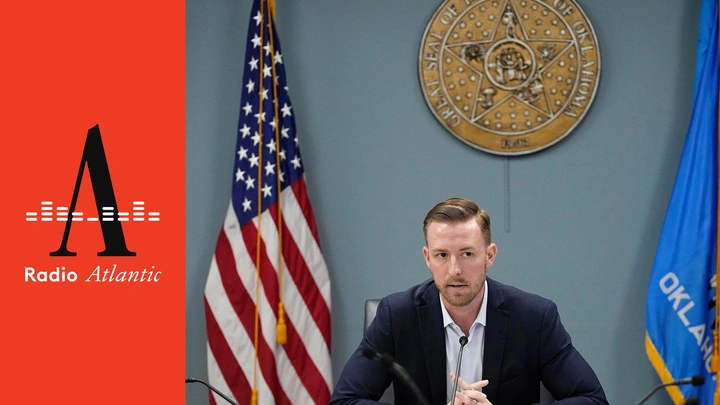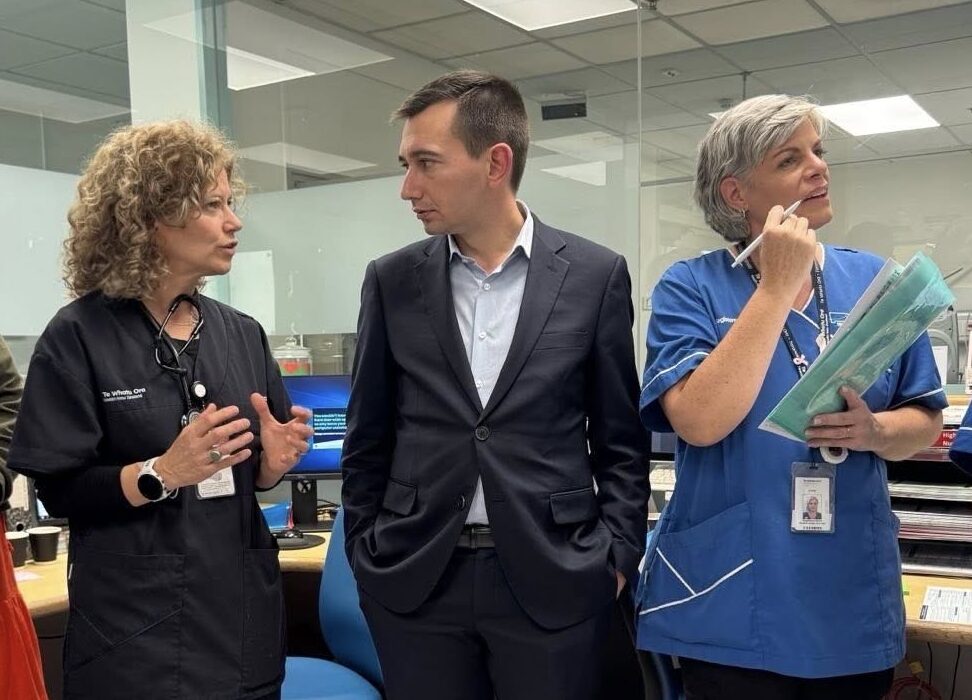By Hanna Rosin
Copyright theatlantic

Subscribe here: Apple Podcasts | Spotify | YouTube | Overcast | Pocket Casts
Testing the line between church and school is a recurring American theme. In Pennsylvania in 2004, a school board tried to introduce teaching “intelligent design” as an alternative to evolution. In 2002 in Georgia, a board tried to add a disclaimer to textbooks saying that evolution was “a theory, not a fact.”
And 2025 is, after all, the 100th anniversary of the Scopes “monkey trial,” when Tennessee put a public-school teacher on trial for teaching evolution.
But what’s been happening to American public schools lately is different: more coordinated, more creative, and blanketing the nation. Pressure on what kids learn and read is coming from national parents’ movements, the White House, the Supreme Court. “There used to be an idea that you could live in a blue state or a red state and sort of encounter the school system a little differently. That maybe if you opposed school-choice programs, especially private-school-choice programs, that you were a little bit immune from this issue if you lived in, say, New York,” says Cara Fitzpatrick, author of The Death of Public School: How Conservatives Won the War Over Education in America. Now there’s “this pressure coming from the Trump administration to say we’re actually going to get very deeply involved in questions around curriculum and options for children.”
We have paid close attention to how conservatives are systematically trying to overhaul the culture at universities. A similar enterprise is unfolding at public schools. In this episode of Radio Atlantic, we visit Oklahoma, where the official in charge of public schools has pushed the line further than most. State superintendent Ryan Walters recently announced an ideology test for new teachers moving to Oklahoma from “places like California and New York.” He’s tried to overhaul the curriculum, adding dozens of references to Christianity and the Bible and making students “identify discrepancies in 2020 elections results.” A group of parents, students, and religious leaders has sued. And just this week, the Oklahoma Supreme Court issued a temporary stay, pausing the standards while it considers the lawsuit.
Walters may eventually lose in court on some of the details. But he’s already succeeded in helping create a new template for what public schools can be. For decades, they’ve been a proving ground for democracy, where people from a community with different views learn to tolerate one another. Walters and a larger conservative movement seem to be trying to redefine public schools as only for an approved type: “If you’re going to come into our state,” he said, “don’t come in with these blue-state values.”
The following is a transcript of the episode:
Hanna Rosin: I remember my first day in an American public school. I had just moved here from Israel. I was nervous about what was in my lunch box: pita with things stuffed inside it. But when I sat down at the lunch table, the whole place was like an international food hall: dal, dumplings, jerk chicken—you get the idea. This was P.S. 117 in Queens, one of the most diverse places on the planet.
The term of art back then to describe our situation—families of every race, configuration, and religion sitting down to eat together—was “melting pot,” which makes it sound like a smooth, warm bisque.
It was not. We were mean to each other, made fun of each other’s holidays, regularly sniffed each other’s lunches and said, “Ew, gross.” Fights broke out nearly every day on the playground.
But every morning, we all showed up and said the Pledge of Allegiance together.
Rosin: I didn’t think about it at all this way when I was a kid, but on top of the English and math and social studies, we were absorbing another lesson that would serve us throughout our life. It was a lesson on messy democracy: how to be around people who ate and thought and believed different things than we did and that our parents did, hate them on some days, and still wake up the next morning and go to school.
To be honest, I wish I had thought about all this sooner. I wish we all had. Because this role that public schools have played—a training ground on how to live with your fellow citizens who aren’t like you—might be disappearing.
I’m Hanna Rosin. This is Radio Atlantic. This episode, we have something different.
Rosin: We took a field trip to Oklahoma, where this war on public schools is probably at its most overt.
Rosin: This is from a video that State Superintendent Ryan Walters of Oklahoma sent out to school administrators across the state. He told them to play it for every student in class and send it to every parent.
Inviting students to pray along with him in school is just one provocative move he’s made.
Rosin: But not every move he makes comes as an invitation. As the state superintendent, Walters has the power to enact policies and influence curriculum.
Of course, he’s not the first American elected official to try and get religion into public schools—2025, after all, is the 100th anniversary of the Scopes “monkey trial,” when Tennessee put a public-school teacher on trial for teaching evolution.
Rosin: But what’s been happening lately is different. Pressure on what kids learn and read is coming from all angles: national parents’ movements, the White House, the Supreme Court. It’s coordinated, it’s more creative, and this war on schools is spreading nationally.
Rosin: War, by the way, is not my lazy metaphor. In the foreground of the Ryan Walters video, on his desk, is a mug. It says Si vis pacem, para bellum, which is Latin for “If you want peace, prepare for war.”
Rosin: Before Ryan Walters was elected, when he was still a candidate, he singled out a specific teacher who seemed to embody for him what he thought was wrong with the public schools.
Her name was Summer Boismier. It was August of 2022, and over at Norman High School, south of Oklahoma City, she was getting her classroom ready. The school year hadn’t officially started, but things were already off.
Boismier recalls that she and the other teachers were called into a meeting and reminded about H.B. 1775, a new bill known as the critical-race-theory ban. That bill forbids teaching things like, quote, “an individual, by virtue of his or her race or sex, is inherently racist, sexist or oppressive, whether consciously or unconsciously.” But that’s about as specific as it gets.
Boismier says they were told to restrict students’ access to any classroom books that could fall under the bill. But restrict how? And which books, exactly?
Rosin: Boismier herself had been a student in Oklahoma public schools, K–12. After she graduated with a B.A. in English from the University of Oklahoma, teaching seemed like the practical career choice—except for one thing.
Rosin: As a kid in school, Boismier was a voracious reader. She loved YA and science fiction. So as a teacher, she wanted to use her love of reading as a way to reach her students.
Over her nine years of teaching, Boismier amassed a huge library for her own personal classroom: 500 books, which the kids could read in class or check out. Most of the books she paid for herself.
And as she spun in her office chair that day, she considered what she should do: Should she remove all those books from her class, turn their spines facing inwards so students couldn’t see the titles, or maybe just cover over the bookshelves with butcher paper?
She chose C.
Rosin: Just wrote it—in black marker, biggish but not too big, and neat enough to read—right on the red butcher paper that covered the bookshelves.
Rosin: The problem for teachers? There is no official list of banned books. But lots of books have been challenged in Oklahoma. For example, in 2022, a state attorney general reviewed a list of about 50 books that included Lord of the Flies, Of Mice and Men, I Know Why the Caged Bird Sings—books that American kids have been reading for decades. He pretty quickly dropped the investigation, saying he would leave it up to parents and local school boards. But that left a problem: How could you possibly know for sure what was and wasn’t okay?
Boismier was upset. She cried for a good hour or two about it. And, in the end, she took the provocative route and added to her display.
Rosin: When you scanned the QR code, it took you to a Brooklyn Public Library program called Books Unbanned, which offers free library cards to teens who may live in places where books are challenged or banned.
Rosin: Summer, I gotta say, you’ve described yourself as shy and awkward—this is a bold-ass plan. This is a plan that you—I don’t know if you were this certain in the moment, like, in the day, or if this certainty is kind of two years down the road, but I’m just noting that, and I’m curious about that.
Rosin: Around the same time, Ryan Walters, then 37, was running for office. He was already secretary of education—he’d been appointed to that position by the governor—and he supported the critical-race-theory ban. But that position is largely symbolic. In Oklahoma, it’s the state superintendent who has the real power to change the schools.
Walters was running against a woman named Jena Nelson, who generally talked about school stuff: career readiness, teacher retention, child and food insecurity. Oklahoma public schools have consistently ranked near the bottom for reading and math scores on the Nation’s Report Card. In a recent national survey, the state came in 48th in education overall. But Walters, in a debate with Nelson, he talked a lot about war.
Rosin: And there was one topic in particular that he kept coming back to.
Rosin: What Walters is referring to are a couple of books that conservatives often bring up in these kinds of debates.
Rosin: Okay, Gender Queer includes pages with a picture of a vibrator and two guys naked, making out. It’s meant for a 16-plus audience, so it seems legitimate to question whether it should be on a bookshelf easily accessible to kids younger than that. But it seems less legitimate to pretend that the book is definitely on bookshelves all over your state.
Rosin: So it was while Walters was out on the campaign trail talking about these so-called pornographic books that Boismier put up the QR code. And on the first day of school, a parent complained. The parent told a local news station that she had scanned the QR code and saw a reading event for Gender Queer from the Brooklyn Public Library.
Boismier was called into a meeting at the district office. She wasn’t fired, but later that day, she chose to resign.
Rosin: And that was that: Boismier was no longer teaching in Oklahoma public schools.
Because of the news, she’d caught the attention of the Brooklyn Public Library, and she was deciding what to do next with her life—like, maybe she would leave the state, try living in a big city. And one day, she got on a Twitter Live—remember those?
Rosin: On August 31, 2022, Walters, who was still campaigning for state superintendent, tweeted a statement about Boismier. It read, quote, “In light of recent events involving Norman High School English Teacher Summer Boismier, I am asking the Oklahoma State Board of Education to revoke her teaching certificate immediately.”
Rosin: The statement from Walters continued: “There is no place for a teacher with a liberal political agenda in the classroom. Ms. Boismier’s providing access to banned and pornographic material to students is unacceptable and we must ensure she doesn’t go to another district and do the same thing.”
Boismier said she started to get threatening messages. One message called her a “pedophile.” Another listed her apartment number. At one point, she even called the police.
Rosin: Walters easily won the seat in November 2022. For a guy who was pretty new to politics, occupying a meat-and-potatoes-type position, he was remarkably good at building a national brand.
Basically, as I see it, he borrowed some influencer tips on growing your audience: Start beefs, often and loudly. Make friends with people who have way more followers than you do. For example, several months into office, Walters shared a video from the Libs of TikTok account. I know you should never try and explain a TikTok, but it featured a Tulsa librarian lip-synching to Ludacris and seemingly admitting to pushing a “woke agenda.” She was probably kidding, but Walters apparently did not read it that way.
For about a week, the librarian and the school received bomb threats. Walters publicly said he actually got bomb threats too. The whole thing was an early hint of how noisy Walters planned to be. Oklahoma state Democrats called for an impeachment probe, and Walters leaned in harder.
He named the Libs of TikTok account founder, Chaya Raichik—who, by the way, is known for using the term groomer, as in gay people infiltrate schools to groom children—to an Oklahoma state library advisory committee.
Rosin: Walters also took a no-mercy approach towards the teachers’ unions.
Rosin: Another time Walters got a lot of attention was when he said teachers could cover the 1921 Tulsa Race Massacre, where white Tulsans slaughtered hundreds of Black people, but they should not, quote, “say that the skin color determined it.”
Walters accused the media of twisting his words. He said the events that day were, quote, “racist, evil,” and “inexcusable.” He also said that “kids should never be made to feel bad or told they are inferior based on the color of their skin.”
The Onion weighed in with this headline, quote, “Oklahoma Schools to Teach Students That Tulsa Massacre Was Crime of Passion From Loving Black People Too Much.”
Rosin: In the early 2000s, I covered the religious right as a reporter for The Washington Post. Back then, the religious homeschooling movement was booming. I wrote a book about it. Their motivating idea was that they had lost the culture war and needed a kind of “quarantine,” as conservative activist Paul Weyrich put it, to protect their children from infection by a culture hostile to Christianity. And so religious families had to create a parallel and protected zone of education for their kids.
Now many of those same religious families are joining forces with Trump. Instead of avoiding public schools, some religious parents are pushing to remake them in their own image. And Trump is on board, vowing to end what he calls, quote, “radical indoctrination” in K–12 schools, threatening to pull funds from schools that teach about gender identity. And he’s made it a priority to expand school choice nationwide—which, in many places, is the catchphrase for “creative ways to shift funds from public schools to private and religious schools.”
Rosin: A generation ago, someone like Walters would be a fringe state official pushing religion in schools. But now he’s at the center of the action.
In June of last year, he directed all Oklahoma public schools to teach the Bible. And in an appearance on Fox News, Walters talked about displaying the Ten Commandments.
Rosin: That one got Trump’s attention. He posted on Truth Social, quote, “Great job by Oklahoma State Superintendent Ryan Walters on FoxNews [sic] last night. Strong, decisive, and knows his ‘stuff.’” And then in all caps: “I LOVE OKLAHOMA!”
Speaking of Trump, Walters wanted to spend millions of dollars in state money to purchase 55,000 Bibles. And the Oklahoma Department of Education put out a bids request that specified the Bibles must be the King James Version and must include a copy of the Pledge of Allegiance, Declaration of Independence, the Constitution, and “must be bound in leather or leather-like material.”
One of the only Bibles that meets that criteria is the “God Bless the USA Bible,” endorsed by Lee Greenwood and President Trump. It sells for $59.99.
[“God Bless the U.S.A.,” by Lee Greenwood]
Rosin: The Education Department later changed some of those requirements and denied that they were meant to cater to one particular Bible. And the Oklahoma Supreme Court has paused the Bible plan for now.
Rosin: But Walters still was not deterred. And what anyone who tracks public education could see is that if there was ever a time to push the limits, it’s now.
Rosin: That Oklahoma case, which proposed using taxpayer funds to operate a religious school, is especially significant. The court was split 4–4, and it likely only failed because Justice Amy Coney Barrett recused herself.
It’s a case one education expert told us would have been unimaginable a few years ago. But right now, public schools are shaky for lots of reasons. Parents have been moving kids to charter or private schools. In the last few years, two-thirds of traditional public schools have lost enrollment. School systems in Florida, New Jersey, Tennessee, and dozens of other states have had to hire consultants to encourage parents to enroll their children in local schools.
And in the public schools that do remain, teachers have to be extra careful, lest they trigger a viral parents’ rights moment.
Rosin: All the moves that Ryan Walters was pulling—the prayer in schools, the Bibles, the civil war, and pornography in the classroom—it struck some people as odd. Because a lot of people knew Walters as someone different: a public-school teacher who taught AP history, who’d been a finalist for Oklahoma Teacher of the Year, whose students loved him.
Rosin: That’s after the break.
Rosin: This is Shane Hood and Starla Edge, both 23. We’re meeting with them in Starla’s living room in Oklahoma City, where her cats are hiding, but the many stuffed animals are in full view.
Like Ryan Walters, Shane and Starla grew up in McAlester, Oklahoma, a place that Starla describes as the biggest city in the middle of nowhere.
Rosin: Shane and Starla have known each other since middle school, but they were not friends back then. Starla came out as queer. She was head of the Gay-Straight Alliance, or GSA, her junior year. Shane, meanwhile, signed a petition to end it.
Rosin: But even back then, Shane and Starla did share one thing in common: Coach Walters was one of their favorite teachers.
Rosin: This is from a video that one of the students recorded of the roast.
[Excerpt from a video recording of “Teardrops on My Scantron”]
[Excerpt from a video recording of “Teardrops on My Scantron”]
Rosin: Starla picked Walters as her homeroom teacher because he let her leave to get coffee as long as she brought one back for him. Starla says her girlfriend was in the same class, and they sometimes walked in holding hands. She said she and Walters would sometimes have coffee together and talk—about school things and life things.
Around that time, Walters was named a finalist for Oklahoma Teacher of the Year. Starla and Shane remember he taught world religions and kept a Torah and a Quran in his classroom and that he skimmed through Christianity because this is the Bible Belt, they recall him saying.
Rosin: Walters had gone part time and then fully left McAlester High School during Shane and Starla’s senior year. Starla says she mailed him a graduation announcement, but it was returned to sender.
Soon after they graduated, Walters’s political career was in full swing. He was still in a suit, still in those clickety-clack dress shoes. For what it’s worth, Walters has said he’s the same guy who taught them history—he hasn’t changed. But to them, he was unrecognizable. Shane compared it to how you’d feel about your dad if he remarried a woman you didn’t like.
Rosin: English teacher Summer Boismier did not stick around to see Walters’s overhaul of the public schools. She had taken what was the monumental personal step of moving away from Oklahoma, away from her mom and her sisters, and all the way to her own apartment in Brooklyn.
She was working with the Brooklyn Public Library in 2023 when a hearing officer in Oklahoma concluded that she had, in fact, not violated H.B. 1775, the critical-race-theory ban. The hearing officer recommended that Boismier’s teaching certificate not be revoked, which would mean that she could one day, if she wanted, go back to teaching.
Rosin: But Walters and the Oklahoma state board ignored those recommendations and instead put it up to a vote.
Rosin: Boismier watched the proceedings from her laptop in New York.
Rosin: In August of 2024, two years after Boismier resigned from her teaching position at Norman High School, the board voted unanimously to revoke her license.
A year after that, she was back in Oklahoma, back at her mom’s house, talking to us about that moment.
Rosin: In Oklahoma, Boismier had family who could support her and keep her safe.
Rosin: This school year, students started off with Ryan Walters’s fingerprints all over the curriculum. For example, for high-school students: “Identify discrepancies in 2020 elections results by looking at graphs and other information.” And: “Identify the source of the COVID-19 pandemic from a Chinese lab.”
But then, just this week, the Oklahoma Supreme Court issued a temporary stay, pausing the standards while it considers a lawsuit challenging them. In that lawsuit, a group of parents, teachers, and religious leaders argued, among other things, that the standards require teachers to present biblical passages as historical facts.
In a statement, Walters called the Oklahoma Supreme Court “embarrassing” and “out of step with Oklahomans.” But Walters can, for now, press ahead with an ideology test for new teachers. Any teachers moving in from “places like California and New York” will have to take an exam designed to guard against “radical leftist ideology.”
Rosin: In our next episode, we talk to Walters.
Rosin: Walters explains what he’s trying to do in Oklahoma schools—and whether he is the same person who taught high-school history to Starla and Shane. And, an awkward one, he addresses a scandal—like, a weird incident—that took place only a few days before we got there. It involves something that Walters himself has brought up a lot.
Rosin: That’s next time.
Rosin: This episode of Radio Atlantic was produced by Jinae West with help from Rosie Hughes. It was edited by Jonathan Menjivar and Claudine Ebeid. Original music and mixing by Rob Smierciak. Fact-checking by Will Gordon and Luis Parrales. Claudine Ebeid is the executive producer of Atlantic audio, and Andrea Valdez is our managing editor.
If you’re an Atlantic subscriber or you become one today, you can listen to Episode 2 in this series now in Apple Podcasts. You can subscribe at TheAtlantic.com/listener.
For nonsubscribers, Episode 2 will be available next Thursday.
I’m Hanna Rosin. Thank you for listening.



